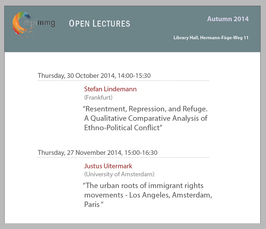"The urban roots of immigrant rights movements - Los Angeles, Amsterdam, Paris"
Open Lectures Autumn 2014
- Date: Nov 27, 2014
- Time: 03:00 PM - 04:30 PM (Local Time Germany)
- Speaker: Justus Uitermark (University of Amsterdam)
- Justus Uitermark is associate professor of sociology at the University of Amsterdam and the Gradus Hendriks professor of Community Development at Erasmus University Rotterdam.
- Location: MPI-MMG, Hermann-Föge-Weg 11, Göttingen
- Room: Library Hall

For more details please contact buethe(at)mmg.mpg.de.
This presentation analyzes the role of cities in driving or curbing immigrant rights movements in France, the Netherlands, and the United States. Drawing on a forthcoming book co-authored with Walter Nicholls, this presentation examines how geography is implicated in the emergence and decline of movements. It argues for a relational approach that examines how and why the networks constituting movements develop by tracing where they develop.
Immigrant rights movements, like all social movements, are composed of complex networks between many activists and stakeholders. Cities provide particularly conducive environments for the mechanisms through which these networks form, diversify, and expand. While many cities are generally concentrations of social movement activity, a select few cities become hubs and assume central roles in shaping the agenda, strategy, and discourses of geographically extensive and complex social movements. Amsterdam, Paris, and Los Angeles became hubs in their respective immigrant rights movements at various moments in time. The first question, then, is how cities become relational incubators and how the networks within urban hubs energize, drive, and direct social movements.
While cities may be hotbeds of social movement activity, they are not necessarily so. There are many reasons why the networks constituting movements erode, fall apart, or fail to develop in the first place. While there are a number of contingencies shaping movement networks, governments play a key role. Governments monitor grassroots organizations and develop techniques to incorporate them into governance networks while presenting them disincentives to organize autonomously from the government or against it. Rewiring the relational circuits of the grassroots is a key objective of governmental control. The second question is therefore how the capacities and relational strategies of governments impact grassroots organizations and movement networks.